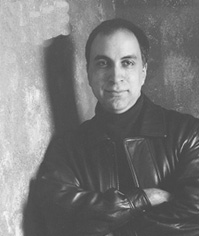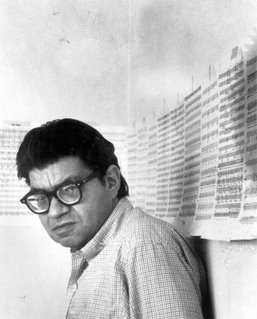
Composer Anthony Cornicello (born in Brooklyn, New York, 1964) writes music that blurs distinctions between performers and electronics, timbre and harmony, composition and improvisation, and explores the boundaries of what may be considered post-classical concert music. His music is vibrant and visceral, full of rhythmic energy and harmonic sophistication, and his forays into live electronics have led to exciting combinations of instruments and processed sound. Cornicello’s background as a jazz pianist is evident not only in the rhythmic activity of his music, but also in his constant investigation of the rich sonorities available from a variety of instruments.
He has been commissioned to write music for the Scorchio Electric String Quartet, ModernWorks! (funding from Meet the Composer/ Commissioning Music USA), the Auros Group for New Music, the Prism Saxophone Quartet, the New York New Music Ensemble, David Holzman, the Group for Contemporary Music, and the InterEnsemble of Padova, Italy. His work has also been featured on the Guggenheim Museum’s “Works and Process” series. Cornicello’s works have also been performed by the Chicago Civic Symphony, Parnassus, ALEA III, Composers Concordance, Madeleine Shapiro, Robert Black, among many other outstanding groups and solo performers. His music has been presented as part of the Darmstadt International Festival of New Music as well as the June in Buffalo Festival.
Cornicello’s Second String Quartet has been recorded by the Atlantic String Quartet; the Second Sonata for Piano by David Holzman (Centaur). More recently, his Post-Modern Waltz was recorded by Eric Moe for Albany Records. A portrait CD of Cornicello’s works is scheduled for 2006 release on Albany Records.
As a performer, he has conducted or played piano in his own works on numerous occasions. While a graduate student at Rutgers, he formed and directed the Janus Ensemble, a group dedicated to contemporary music. More recently, Cornicello has begun performing on the laptop, using a variety of interfaces and the Max/MSP program. Those performances, mostly with EEE!, have had a notable impact on his music, as EEE!’s music ranges from hip-hop to experimental noise. EEE! is based at Eastern Connecticut State University, where Cornicello is an Associate Professor and Director of the Electronic Music Lab.
Cornicello received the Ph.D. from Brandeis University, where he studied with David Rakowski, Eric Chasalow, and Martin Boykan. His teachers also include Charles Wuorinen, Gérard Grisey, and Richard Beirach.
His current fields of interest include developing unusual interfaces for live computer music performances, as well as continuing to investigate resonance and spatialization. His recent and current projects (mostly for string instruments and electronics) have been exploring the latter two, and the series of experimental works ReZenant Garden, performed by EEE! have operated on all three areas of interest. Future projects will include works for instrumental groups or soloists and electronics, as well as turntablists.
Cornicello's works are published by C.F. Peters Corporation and APNM, and he is a member of BMI.
|
|
|
|
|
|

Monday, October 22, 2007
Morton Feldman!

This semester, I'm teaching a class on Music of the 20th (& 21st) Centuries. One of the benefits of teaching such a class is that it gives me the opportunity to revisit some composers that I've been neglecting as of late. During the early part of the course, I had a chance to sit down with some Ravel and Satie, and then some Messiaen. But most recently, I've been thinking about Morton Feldman.
There he is, on the right, with the score to his massive Second String Quartet. I never got to meet him, and I'm not sure how I would have reacted to him in, say, 1987. But after reading some of his texts and hearing him speak online, I'd like to think that I would have gotten along with him. He certainly had a good mixture of intellect and wit!
The Internet Archive has a wonderful interview with Feldman; actually, they have a few. I listened to this one with Charles Amirkhanian. Feldman comes off as unpretentious, and practical (certainly odd, given the fact that he'd just written a 5 1/2 hour string quartet!).
There are a few gems in here: the comments about Boulez and Babbitt were insightful (although I've got to go back and listen to the Boulez passage again). It never ceases to amaze me: as original and unconventional as Feldman (and others like Cage or Phil Corner) was (or "is", in Corner's case), they have a deep knowledge of traditional music. There are some who you feel compose music because they know little else; not so with someone like Feldman. These people made their choices after surveying what's around them! If I'm not mistaken, in the interview, Feldman talks about himself recently studying a Boulez score.
In some of Feldman's writings, we come upon his relationship with Stockhausen. According to Morty, Stockhausen became quite interested in Feldman's work in the 1960s. Yet, I recall other sources describing Stockhausen as falling under Cage's influence. I'm not sure which is true, but the whole idea of influence is brought up during this lecture, I think in conjunction with Boulez. Feldman talks about Boulez in the 60s, how those "open form" pieces were just co-opted from himself and Earle Brown. And, on that point, I see how Boulez, returning to France in the late '70s, certainly learned a great deal (co-opted?) from the Spectralists; you can hear Derive and even parts of Répons as his own response to those composers.
It does bring up an interesting question, though: are good leaders really clever followers? We can think of many instances: Cage and Feldman, for that matter. Or Miles Davis, constantly regenerating himself via the younger players in his band. We think of leaders as being original thinkers (and most are, of course), but maybe they just have a bit of insight to the ideas all around them. It gives you the image of bits and pieces of ideas floating around us all, waiting for someone to grab a few of them, put them together the right way, and maybe turn it just so. There! A spark of genius!
posted by Anthony Cornicello
|
| |



